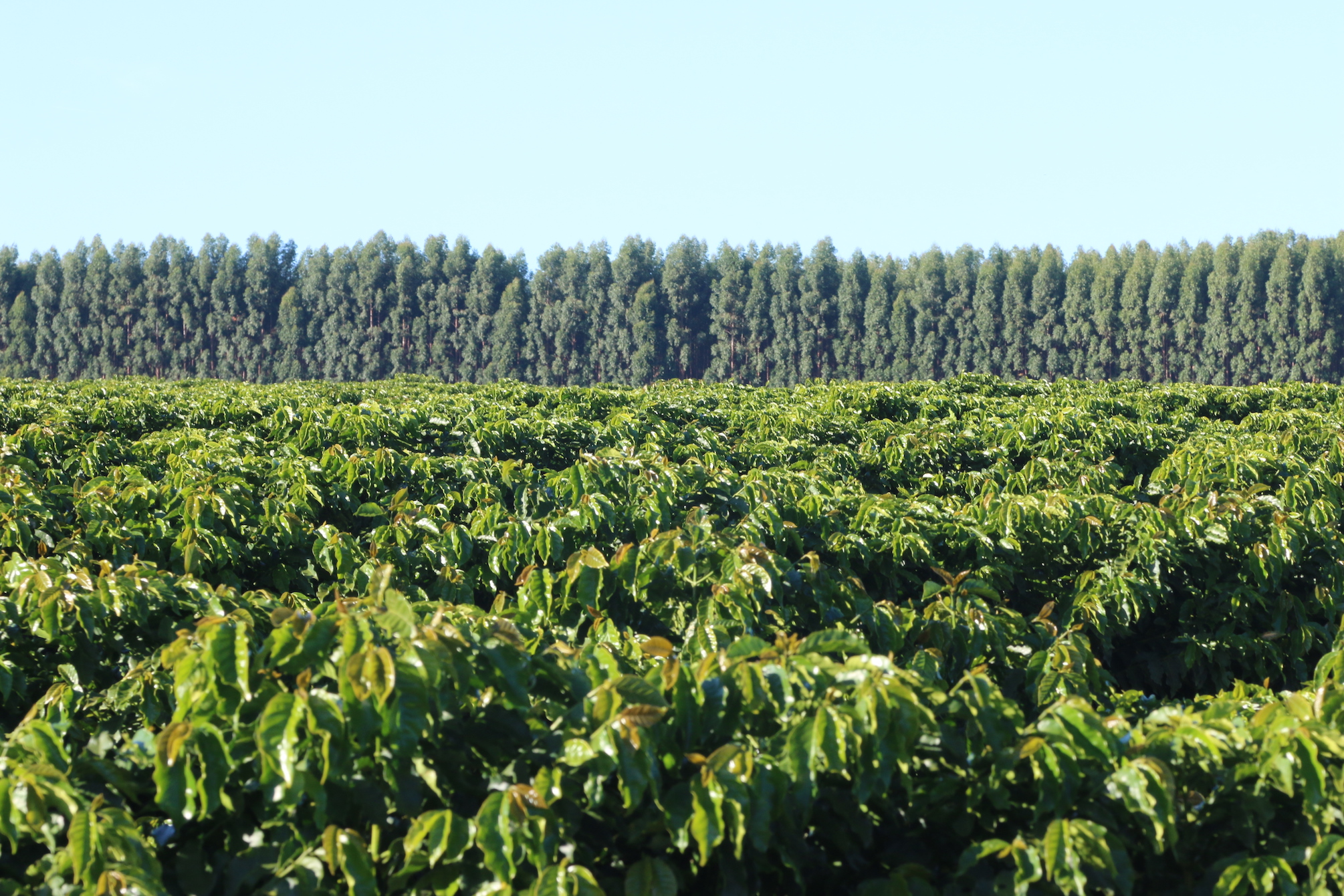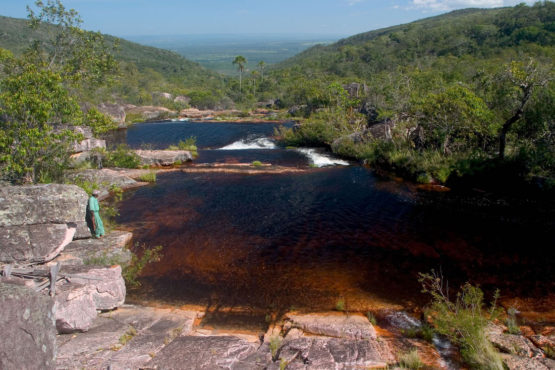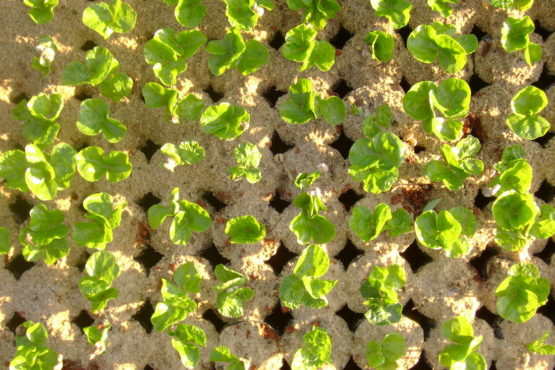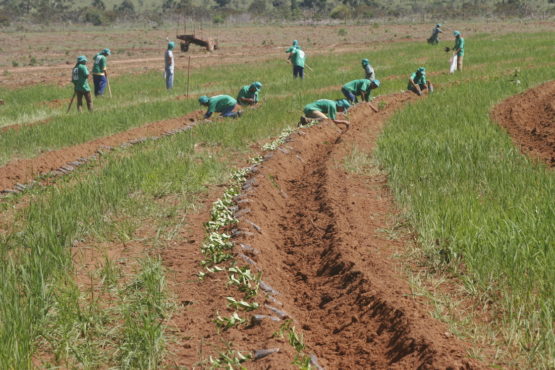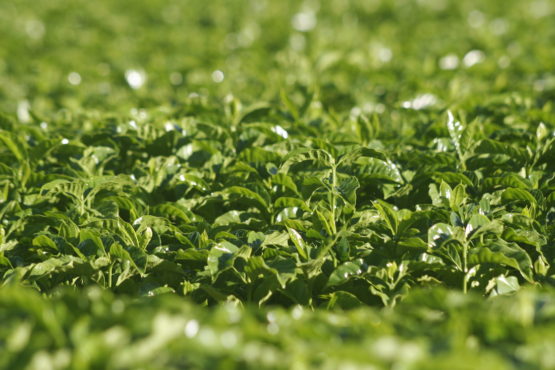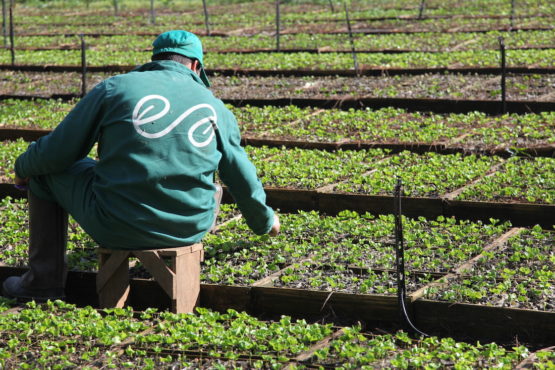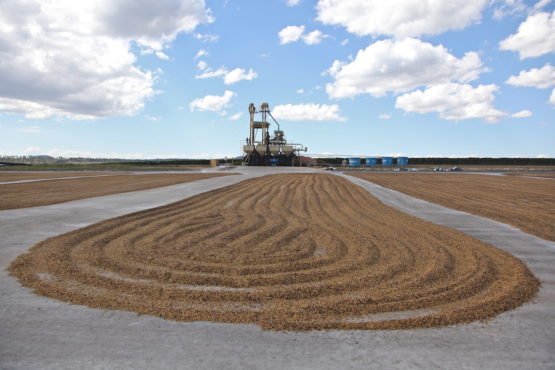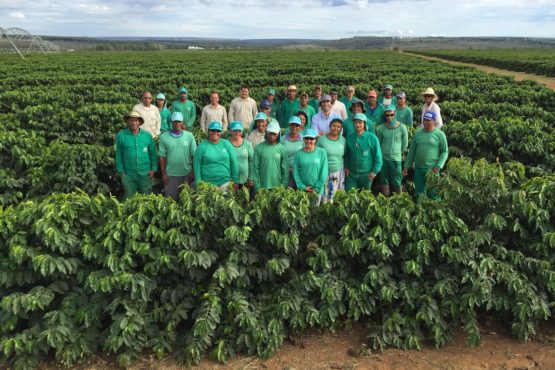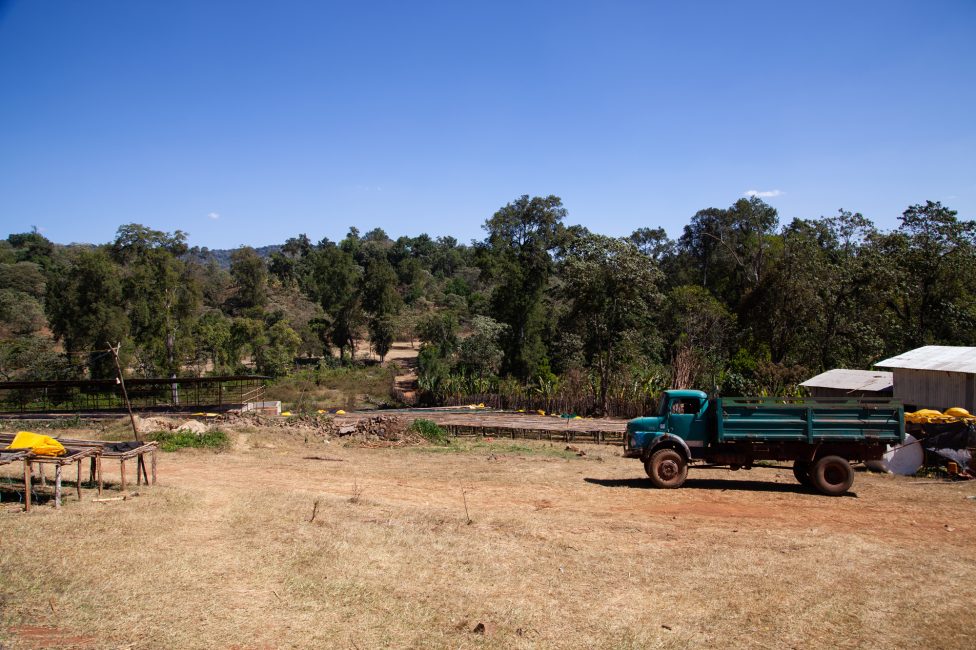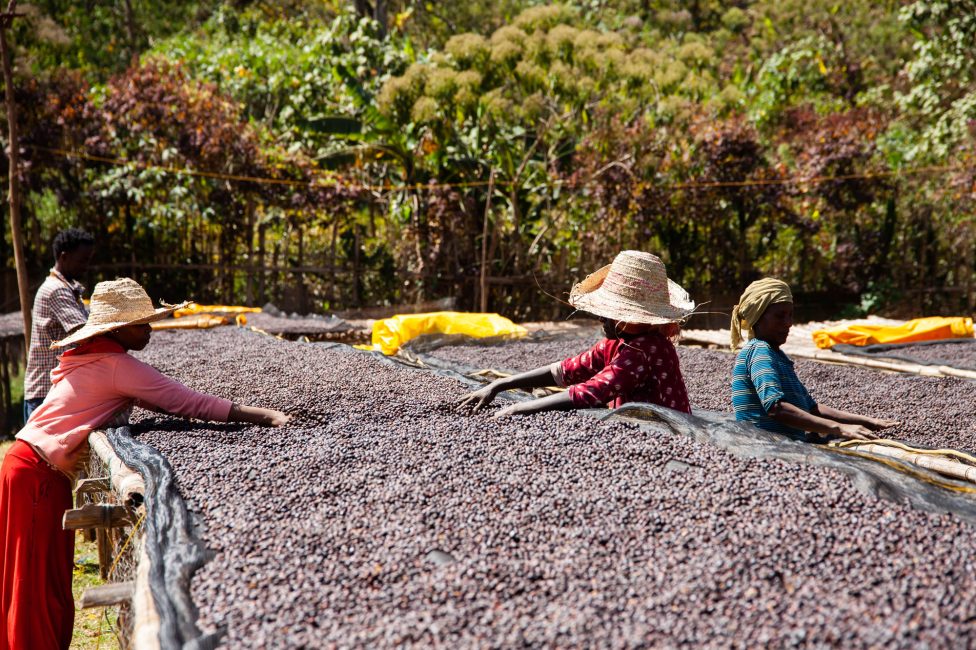Serra do Cabral
Transparent and balanced, with mandarin acidity, maple syrup sweetness and stone fruit, dark chocolate, roasted almonds and a lingering finish.
Serra do Cabral (“Goat Mountain”) is located at 1,100 metres above sea level in the Serra do Cabral plateau, a stunning region in the Chapada de Minas in the central north of the Minas Gerais State in Brazil. This lush and fertile region provides a unique micro climate and ideal conditions for growing fine coffee, with a high altitude of 1,100m above sea level, and a mild climate with sunny days and cool nights, a very well defined rain and dry seasons, and plentiful water and a flat terrain.
The estate is managed by Marcelo and Roberto Flanzer, who are brothers and have worked together since they were very young on their family business, “Ecoagricola” with their father Henrique, who is now retired. Marcelo, 46, oversees all of the production and quality control and Roberto, 48, manages the operations on the farm.
The Flanzer family have owned their estate for over 40 years, since 1975, however they have only started to specialise in coffee production over the last decade. This decision was driven by Marcelo and Roberto who took over the farm in early 2000 and wanted to diversify.
“Among many possibilities, we chose coffee for the great fit with the region: altitude, climate, water, terroir. It also met our goal to build the business in a environmentally sustainable way using technology, and our desire to be able to produce quality driven products” – Marcelo Flanzer
After recognising that the region had the ideal conditions to grow high quality coffee, the family planted their first coffee nursery in 2006 and their first harvest was in 2009. Today 340 hectares of the 1,700-hectare estate is dedicated to coffee, and is planted out with Red Catuaí 144 and Yellow Catucaí variety trees. Red Catuaí 144 was chosen because it is the most used and tested variety at the ‘Cerrado’ biosphere in Minas Gerais. Yellow Catucaí was chosen after testing 15 different varieties at the property. It presented the best cup quality and best yield. It also ripened earlier in the season compared to Red Catuaí 144, which has helped with planning labour during the harvest. The brothers also have plans to introduce a small area of Yellow Bourbon in the near future.
Marcelo and Roberto have focused on producing the highest quality coffee possible and balanced this objective carefully with working to preserve and protect the local water sources and preserve the natural forest areas. Over 50% (860 hectares) of the estate is dedicated to a natural reserve, that has crystal clear streams, native Cerrado Bioma vegetation and abundant wildlife. Ecological corridors run throughout the estate, allowing the free movement of animals and help maintain the area’s ecosystem and biodiversity. The natural reserve also plays a role in acting to inhibit the development of coffee pests, and therefore the need for pest control and chemicals.
Environmental sustainability has always been intrinsic to the Flanzer’s family’s mission, and large portions of the estate have always been dedicated to natural reserve.
“Sustainability and ethics are very important to us. Today sustainability is very fashionable, but when we began to produce here in the 1970s it was something just a few people cared about… To us sustainability means creating something that is environmentally responsible, socially fair and economically viable” – Marcelo Flanzer
The concept of preservation is built into the Flanzer family company’s name, Ecoagricola. “Eco” refers to “ecological” and “Agrícola” means “agriculture”. According to Marcelo and Roberto, the very purpose of the agricultural side of their business is to generate funding for ecological preservation. They’ve been incredibly successful and have, as of 2017, been re-certified by Rainforest Alliance with a grade of 97.7 out of 100.
In addition to their RA certification, EcoAgricola are also UTZ certified and are also members of the BSCA. These certifications help us make sure our work is done well, Marcelo explained when we asked why he had gotten certified. “They make annual audits and check everything, and even do surprise audits as well”.
When Marcelo and Roberto started to produce coffee, there were two big challenges that they faced. Firstly, coffee had never been produced in the region before, so there was little infrastructure and no ‘accepted’ practices that had been developed and adapted over time in the region. In addition the brothers had no experience in coffee production, and so they surrounded themselves with experts who were able to guide them to make decisions that would maximise quality and yield, and advise them how to do things in the most environmentally responsible way.
One of the first decisions the boys had to make was how to irrigate the coffee plantation. After much consideration of factors such as water availability and terrain, they chose to use pivot irrigation. This method of crop irrigation (also known as ‘waterwheel’ or ‘circle’ irrigation) involves equipment that rotates around a central pivot and waters the crops with sprinklers. The sprinklers will irrigate a circular area around the pivot point, often creating a circular pattern in crops when viewed from above. Center pivot irrigation typically uses less water compared to many surface irrigation and furrow irrigation techniques, helping to conserve water.
Water for the property is sourced from the natural springs as well as dams which are used in drier periods. The dams have been built at higher elevations which means they are able to water the farm by gravity therefore saving energy.
Over the last decade, the brothers have succeeded in installing five pivots, all of which use LEPA (Low Energy Precision Application) technology. LEPA ensures that the plant canopy remains dry and water is applied directly to the furrow — typically every other furrow. Delivering water directly to every other furrow requires some special management and tillage practices, but also is one of the most energy and resource efficient means of irrigation. They have also installed weather stations and monitoring systems that measure things like soil moisture, rainfall and evaporation rates, to help with inputs assessment. In 2016 they began utilising the “precision agriculture system”, which measures not only the average input needs for the whole plantation but also the different needs of every individual hectare, and then with aid of GPS monitoring, they are able to ensure that each plant receives only the nutrients and water it needs.
HOW THIS COFFEE WAS PROCESSED
Since 2015, the Flanzer family have embarked on a quality driven project for post harvesting with the University of Lavras (UFLA), coordinated by Professor Flavio Borém. Professor Broém is one of the world’s leading coffee quality researchers, and his advice has been crucial in informing the farm’s post harvest practices.
Lots are defined by plot, variety and method (natural, pulped natural), and 100% traceability is maintained from the moment the cherry is picked. During quality control and sensory analysis every lot is assessed by the lab team (which is headed up by full time Q-Grader), and any quality issues can be traced back to the individual hectare, helping identify and prevent any future issues.
This coffee was selectively hand harvested. During the harvest season the farm’s work force of 50 doubles to 100 people, all of whom are trained in best practices. After the ripe cherries are picked, they are taken to the farm’s mill where they are processed using either the Natural or the Pulped natural method. The farm has also started experimenting with some Fully washed lots and other methods of fermentation, though this is in the very early stages.
Special care is taken with pulped natural lots, such as this 100% Yellow Catucaí lot. After being picked, the coffee is sorted to remove any additional underripe or damaged cherries. It is pulped and then delivered to the farm’s extensive patios, where it is dried carefully over 7 or more days. During this period it is turned regularly to ensure it dries evenly. After 45 – 60 days rest the coffee is then dry milled at the farm’s own dry mill.
COMMITMENT TO SUSTAINABILITY
In addition to the natural reserve on their property the Flanzer family also maintain the Reserva da Borralha, which adjoins their farm, and boasts 2,000 hectares of land completely untouched by man and rich with biodiversity. Birds that migrate southwards from North America, stop at this reserve to rest and feed and the Concolor Puma roams through the undergrowth. The presence of this rare cat (whose face graces the Serra do Cabral bags) is a definitive sign that all in the food chain is present and preserved.
Intent on maintaining this incredibly unique and special environment, the Flanzer family are board members of the Serra do Cabral State Park, and actively contribute to their plans and actions. The estate’s sustainable education program was merged with the Park’s program, meaning that their message of conservation not only reaches their own employees but also the wider community. They regularly give sustainability talks at local community, schools, as well as with local neighbours and small businesses. These talks are often centred around driving home the importance of protecting the natural spring and reducing waste. In addition, the have built up an extensive native-species nursery where they cultivate seeds collected around the estate, raise them to seedlings, and then donate them to the national park, neighbours, and the city councils etc.
“It is important for us to have a business that is economically viable, but we also want to ensure that we leave a legacy for future generations. It is a great priviledge for us to be here.” – Marcelo Flanzer
In addition to their conservation activities, Ecoagricola engages socially with the small farmer communities that surround them. They have helped many of these small farmers with “fiscal education” and helped them sell their produce at the estate’s canteen and also to other companies and markets. Marcelo and Roberto also regularly participate in their community meetings and try to find ways to collectively help and support their local community. They also help directly by investing in specific community needs, such as school repairs, uniforms for students etc.
Judite the cook of Serra do Crabral, summed up the Flanzer approach to business, their staff and their community beautifully “Here we don’t have boss and employee, we have family”. We are excited to be part of this family, and looking forward to establishing a very meaningful, positive and fruitful relationship with Marcelo and Roberto. Their professionalism, enthusiasm, openness and motivation to continue to improve and do things better is exciting and inspiring. The results of their hard work are already in the cup, and we can’t wait to see how they continue to evolve, and be part of this journey with them.
